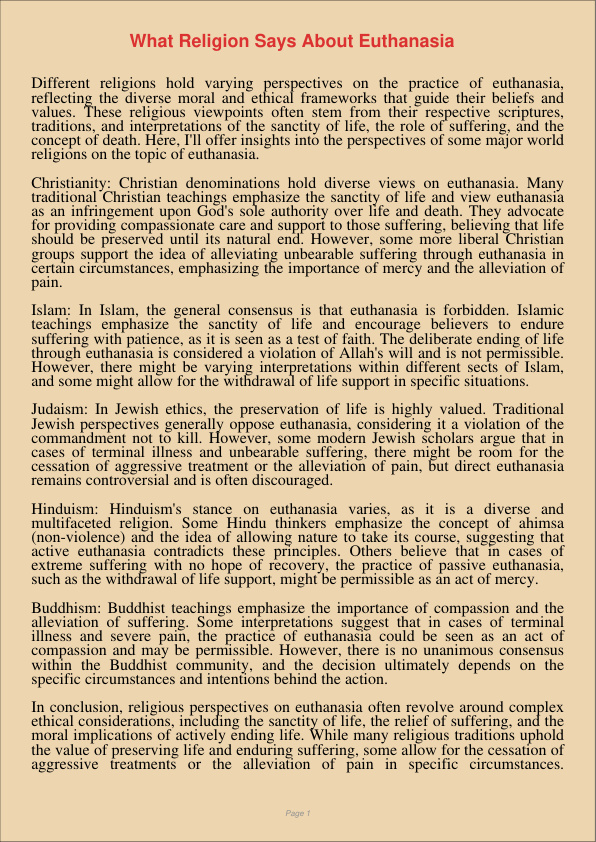What Religion Says About Euthanasia
Dec 31, 2023
religion says
euthanasia
Social science
History
Different religions hold varying perspectives on the practice of euthanasia, reflecting the diverse moral and ethical frameworks that guide their beliefs and values. These religious viewpoints often stem from their respective scriptures, traditions, and interpretations of the sanctity of life, the role of suffering, and the concept of death. Here, I’ll offer insights into the perspectives of some major world religions on the topic of euthanasia.
Christianity: Christian denominations hold diverse views on euthanasia. Many traditional Christian teachings emphasize the sanctity of life and view euthanasia as an infringement upon God’s sole authority over life and death. They advocate for providing compassionate care and support to those suffering, believing that life should be preserved until its natural end. However, some more liberal Christian groups support the idea of alleviating unbearable suffering through euthanasia in certain circumstances, emphasizing the importance of mercy and the alleviation of pain.
Islam: In Islam, the general consensus is that euthanasia is forbidden. Islamic teachings emphasize the sanctity of life and encourage believers to endure suffering with patience, as it is seen as a test of faith. The deliberate ending of life through euthanasia is considered a violation of Allah’s will and is not permissible. However, there might be varying interpretations within different sects of Islam, and some might allow for the withdrawal of life support in specific situations.
Judaism: In Jewish ethics, the preservation of life is highly valued. Traditional Jewish perspectives generally oppose euthanasia, considering it a violation of the commandment not to kill. However, some modern Jewish scholars argue that in cases of terminal illness and unbearable suffering, there might be room for the cessation of aggressive treatment or the alleviation of pain, but direct euthanasia remains controversial and is often discouraged.
Hinduism: Hinduism’s stance on euthanasia varies, as it is a diverse and multifaceted religion. Some Hindu thinkers emphasize the concept of ahimsa (non-violence) and the idea of allowing nature to take its course, suggesting that active euthanasia contradicts these principles. Others believe that in cases of extreme suffering with no hope of recovery, the practice of passive euthanasia, such as the withdrawal of life support, might be permissible as an act of mercy.
Buddhism: Buddhist teachings emphasize the importance of compassion and the alleviation of suffering. Some interpretations suggest that in cases of terminal illness and severe pain, the practice of euthanasia could be seen as an act of compassion and may be permissible. However, there is no unanimous consensus within the Buddhist community, and the decision ultimately depends on the specific circumstances and intentions behind the action.
In conclusion, religious perspectives on euthanasia often revolve around complex ethical considerations, including the sanctity of life, the relief of suffering, and the moral implications of actively ending life. While many religious traditions uphold the value of preserving life and enduring suffering, some allow for the cessation of aggressive treatments or the alleviation of pain in specific circumstances. Understanding these diverse perspectives can provide valuable insights into the complex ethical debates surrounding end-of-life care and the practice of euthanasia.
